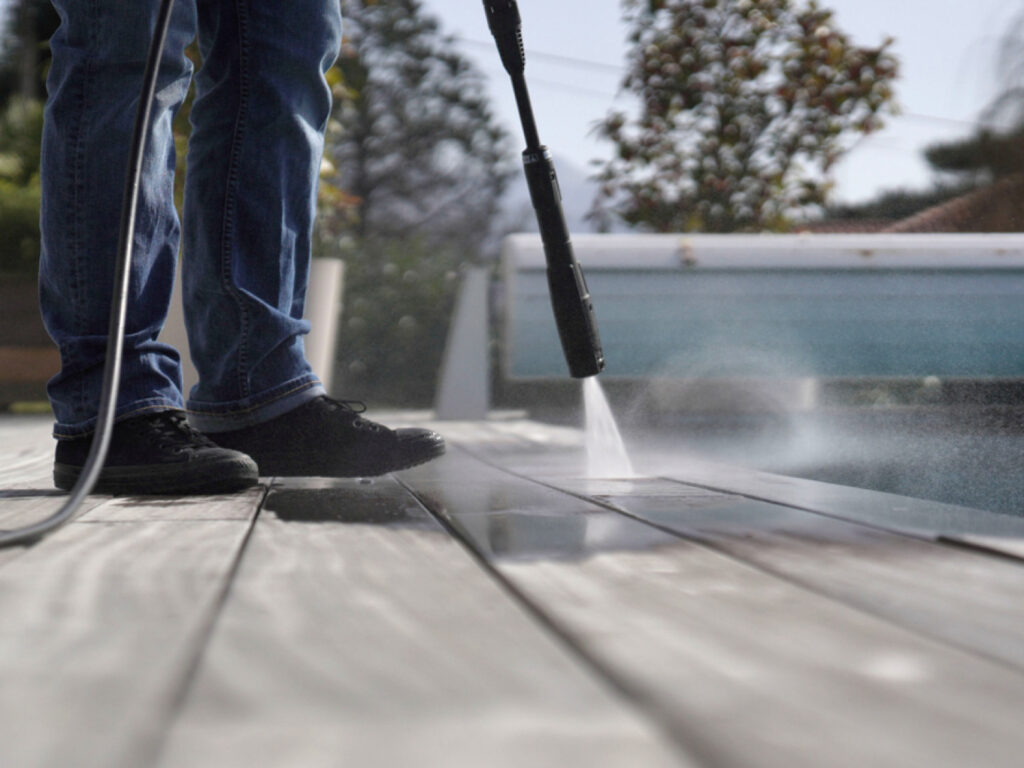Pressure washing is a popular method for cleaning various surfaces, including driveways, patios, and sidewalks. However, homeowners often wonder: can pressure washing damage concrete? The short answer is yes, but the extent of damage largely depends on how the process is carried out. This article explores the risks, causes, and preventive measures associated with pressure washing concrete, offering professional insights to help protect your surfaces.
Understanding Concrete and Its Vulnerabilities
Concrete is a durable and widely used material in residential and commercial construction. Despite its strength, it’s not impervious to damage. To understand how pressure washing can harm concrete, it’s essential to examine its composition and potential vulnerabilities.
What Is Concrete Made Of?
Concrete is a composite material composed of:
- Cement—the binding agent that holds everything together.
- Aggregate—sand, gravel, or crushed stone that adds strength.
- Water—activates the cement to form a hard, rock-like structure. While concrete is robust, its surface can be porous and susceptible to wear, especially if it’s old, poorly cured, or contains weak spots.
Factors That Make Concrete Vulnerable
- Age: Older concrete tends to develop cracks and become more brittle over time.
- Sealing: Unsealed concrete is more prone to water penetration and erosion.
- Surface Finish: Smooth or decorative finishes can be more easily damaged than rough finishes.
How to Safely Pressure Wash Concrete
To avoid damaging your concrete surfaces, follow these professional tips:
- Choose the Right Pressure Washer
Select a pressure washer with adjustable PSI settings. For most concrete surfaces, a range of 2,500 to 3,000 PSI is effective and safe. Avoid exceeding this range unless the surface is particularly tough and durable. - Use the Appropriate Nozzle
Opt for a nozzle with a wider spray angle, such as 25 or 40 degrees. This reduces the intensity of the water jet and minimizes the risk of damage. - Maintain a Safe Distance
Keep the nozzle at least 12-18 inches away from the surface. This ensures that the pressure is distributed evenly, preventing concentrated force from harming the concrete. - Seal the Concrete
Applying a concrete sealer after cleaning helps protect the surface from water intrusion, stains, and future damage. - Test a Small Area First
Before cleaning the entire surface, test the pressure washer on a small, inconspicuous area. This helps gauge the appropriate pressure and technique. - Use Detergents Wisely
When dealing with tough stains, use a concrete-safe detergent rather than relying solely on high pressure. This allows you to clean effectively without overburdening the surface. - Hire Pressure Washing Experts
For optimal results and to avoid potential damage, consider hiring professional pressure washing They have the right equipment and expertise to clean your concrete safely and efficiently, saving you time and effort.
How Pressure Washing Can Damage Concrete
Pressure washing involves the use of high-pressure water jets to remove dirt, stains, and other debris from surfaces. While effective, the high pressure can also cause unintended harm to concrete if not used correctly.
Potential Types of Damage
- Surface Etching Excessively high pressure can strip away the top layer of concrete, leading to etching. This creates uneven surfaces and exposes the aggregate, making the concrete appear rough and unappealing.
- Cracks and Chips Applying too much pressure or holding the nozzle too close to the surface can cause cracks or small chips, especially in already weak or aged concrete.
- Water Intrusion If the surface is porous, pressure washing can force water into small cracks or openings, which can expand in freezing temperatures and lead to further damage.
- Damage to Decorative Concrete Stamped or stained concrete is particularly vulnerable, as the pressure can strip away decorative finishes and colors.
Common Mistakes That Lead to Damage.
Many instances of pressure washing damage result from improper techniques or lack of experience. Here are some common mistakes:
- Using Excessive Pressure Most pressure washers allow users to adjust the PSI (pounds per square inch). Setting the pressure too high for concrete cleaning can lead to surface damage.
- Incorrect Nozzle Selection Nozzles determine the spray angle and intensity of the water jet. A narrow-angle nozzle (e.g., 0 degrees) concentrates the force, increasing the risk of damage.
- Holding the Nozzle Too Close The closer the nozzle is to the concrete surface, the greater the pressure. Keeping it too close can cause etching or cracks.
- Inconsistent Movement Keeping the water jet focused on one spot for too long can wear down the surface, creating noticeable damage.
Signs of Pressure Washing Damage
If your concrete has been damaged during pressure washing, you may notice:
- Uneven or rough patches.
- Exposed aggregate.
- Small cracks or chips.
- Faded or stripped finishes on decorative concrete.
Preventive Measures to Protect Concrete
To ensure your concrete remains in good condition, consider these preventive measures:
- Regular Maintenance Clean your concrete surfaces periodically with mild detergents and low-pressure water to prevent the buildup of dirt and stains.
- Use Protective Coatings Applying a sealant or epoxy coating provides an additional layer of protection against water, stains, and wear.
- Schedule Professional Cleaning Hiring an experienced professional to pressure wash your concrete ensures the job is done safely and effectively.
- Address Issues Promptly Repair cracks and other issues as soon as they appear to prevent further deterioration.
Conclusion
So, can pressure washing damage concrete? Yes, but with proper technique, equipment, and precautions, you can safely clean your concrete surfaces without causing harm. By understanding the potential risks and following the recommended practices, you can maintain the appearance and longevity of your concrete while avoiding costly repairs.
For professional pressure washing services tailored to your needs, consult an experienced contractor who understands how to care for concrete surfaces effectively. Contact us today for expert pressure washing services in North Kansas City and nearby areas. Taking the right approach ensures your property remains clean, attractive, and damage-free for years to come.

